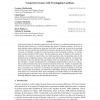1632 search results - page 147 / 327 » Modeling billiards games |
ANOR
2002
14 years 10 months ago
2002
We consider an inspection game played on a continuous finite time interval. The inspector wishes to detect a violation as soon as possible after it has been made by the operator. T...
ATAL
2009
Springer
2009
Springer
Effective solutions for real-world Stackelberg games: when agents must deal with human uncertainties
15 years 4 months ago
How do we build multiagent algorithms for agent interactions with human adversaries? Stackelberg games are natural models for many important applications that involve human intera...
104
click to vote
SIGECOM
2005
ACM
15 years 3 months ago
2005
ACM
We introduce a new class of games, congestion games with failures (CGFs), which extends the class of congestion games to allow for facility failures. In a basic CGF (BCGF) agents ...
JAIR
2010
14 years 8 months ago
2010
In the usual models of cooperative game theory, the outcome of a coalition formation process is either the grand coalition or a coalition structure that consists of disjoint coali...
82
Voted
ECAI
2006
Springer
15 years 1 months ago
2006
Springer
Abstract. Computational Game Theory is a way to study and evaluate behaviors using game theory models, via agent-based computer simulations. One of the most known example of this a...

